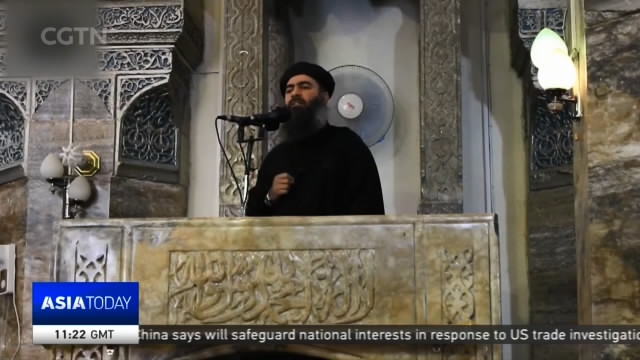
19:51, 21-Mar-2018
Iraq War 15 Years On: Rise and fall of ISIL after Iraq war

Fifteen years ago, a US-led coalition entered Iraq to oust former leader Saddam Hussein. What was supposed to be a short war led to a protracted occupation, marked by a violent insurgency and sectarian bloodshed. After the US left, the most brutal terror group the world had ever seen emerged, plunging the nation back into war. CGTN's Jack Barton reports from Baghdad on Islamic State's rise and fall.
JACK BARTON BAGHDAD, IRAQ "Fifteen years ago people here in Baghdad watched the sun rise over a city subjected to a night of so-called 'shock and awe' airstrikes that marked the start of the Iraq war. Rather than peace and stability they soon faced a sectarian conflict that ultimately led to the rise of a group so brutal and powerful it threatened to erase the name Iraq in its quest to build a global Islamist caliphate".
ISIL emerged from the remnants of al Qaeda in Iraq, which in turn grew out of the sectarian conflict that followed the U.S. led invasion in 2003.
In 2014 the jihadist group made headlines worldwide as it captured large swathes of Iraq and Syria, carrying out regular atrocities including beheadings and the mass murder of captured Iraqi soldiers.
AHMED AL-SHARIFY STRATEGIC STUDIES EXPERT "No one could accept what was happening, all the Iraqis of culture could not accept, Sunnis or Shiites even other sects would not accept, but because of the bad mismanagement of the crisis as well as the security and military who didn't do their constitutional job, that's why there was a collapse".
Later that year the group's leader Abu Bakr al-Baghdadi stood in a mosque in recently captured Mosul where he announced the creation of an Islamic State caliphate that pushed as far west as Aleppo in Syria.
Two months later a U.S.-led coalition began airstrikes targeting the group in Iraq, expanding the bombing campaign into Syria the following month.
ISIL lost some territory.
But more than 8000 airstrikes over twelve months failed to dislodge the extremist group from it strongholds.
All the while ISIL expanded into other countries including Libya while carrying out attacks abroad from France and Egypt to the United States.
In 2016 the tide finally began to turn in Iraq, with the country's Special Forces recapturing key cities like Tikrit and Fallujah.
The final battle for ISIL's stronghold Mosul was the world's largest military operation since the U.S. led invasion.
ISIL brought unimaginable misery, but the fight against them also brought a degree of unity to a country divided along religious lines.
TABARAK TALIB ARABIC LANGUAGE STUDENT "What happened was a great thing and shows how Iraqis are brave and proud of their country, all Sunnis and Shiites and the rest inside Iraq, their cooperation has made a great event and we were really proud of it in front of the rest of the world"
The challenge now is to build on the unity forged in the fight against the extremists. Jack Barton, CGTN, Baghdad.

SITEMAP
Copyright © 2018 CGTN. Beijing ICP prepared NO.16065310-3
Copyright © 2018 CGTN. Beijing ICP prepared NO.16065310-3